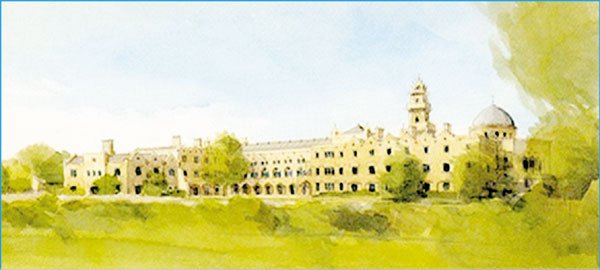A group of residents has asked the court to halt construction of the San Martin Cordoba Center due to the project’s possible harmful impact on the environment.
The residents, known as the People’s Coalition for Government Accountability (PCGA), filed a lawsuit to that effect in Santa Clara County Superior Court Nov. 20.
Santa Clara County as well as the Board of Supervisors and the Planning Commission are named in the lawsuit.
The PCGA’s complaint states that the County should have undertaken an extensive environmental impact study and report prior to approving the project that includes a mosque, multi-purpose hall and cemetery.
“The record contains substantial evidence supporting a fair argument of potentially significant site-specific and cumulative environmental impacts,” including violations of the county’s general plan and inconsistencies with county land use practices, the complaint states.
The lawsuit claims the project might result in harmful septic system and groundwater impacts, flooding and drainage problems, as well as aesthetic, traffic and biological impacts.
The PCGA is asking the court to “void all approvals relating to the Cordoba Center,” and stop all preparation for construction before it causes “significant irreparable and irreversible environmental impacts in San Martin.”
The five-member Board of Supervisors unanimously approved the San Martin Cordoba Center Sept. 25. At that meeting, the board also denied three appeals to the permit, which was granted to the project by the County Planning Commission Aug. 2.
The Cordoba Center was proposed by the South Valley Islamic Center in 2011 as a worship and events center for the area’s Muslim population, as well as a potential site for special events for the surrounding community.
The project is approved for a 15-acre site on Monterey Road, just north of the intersection of California Avenue. Included is a 5,000-square-foot prayer hall, 2,800-square-foot multi-purpose hall, a two-acre cemetery, and open space.
The Planning Commission’s permit restrictions, which the supervisors approved, include a daily attendance limit of 80 people, with a maximum of 150 four times a year for special events. The limit was imposed to minimize the facility’s impact on groundwater, septic system, traffic and other concerns, County staff said.
The supervisors approved the project after County staff and consultants conducted a series of studies on the potential impact of the project. Those studies found that the SVIC’s proposal would have no significant negative impact on the environment, roads, utilities or surrounding neighborhood.
The approval also followed several public hearings and planning advisory meetings that drew hundreds of South County residents who voiced passionate displeasure with the SVIC proposal, claiming the project would potentially harm the environment and disrupt the rural quality of life of the 7,000-person San Martin community.
The PCGA’s complaint does not list any specific evidence of the project’s potential harmful impact; nor does it provide counter-studies to refute the County’s findings. Rather, the PCGA suggests the County’s studies were not thorough enough, and the County should have performed a full-blown Environmental Impact Report on the site.
“The County failed to study the whole of the action,” the PCGA complaint states.
The project did not meet the California Environmental Quality Act’s requirements for such a large-scale study, according to County staff.
The County Counsel’s office is currently reviewing the PCGA’s complaint, according to Assistant County Counsel Orry Korb.
“We believe the process employed by the County in reviewing and ultimately acting on the project were proper under all relevant laws, including (CEQA),” Korb said.
SVIC spokesman Hamdy Abbass declined to comment on the PCGA lawsuit.
SVIC members, who reside throughout South County and San Benito County, have gathered for prayer and religious services at a privately owned barn in San Martin for about 20 years.
The Cordoba Center is their effort to establish a permanent facility for religious services and events.
The PCGA describes itself in the complaint as “an unincorporated association formed in the public interest to promote open, fair, well-informed, and responsible land use planning in Santa Clara County.”
PCGA members, who are not listed by name, “include community residents and concerned citizens who personally enjoy and appreciate the significant environmental resources in the unincorporated area of San Martin.”
The PCGA submitted one of the three appeals to the project that was ultimately denied by the supervisors in September.
The San Martin Neighborhood Alliance also submitted one of the appeals, citing concerns similar to the PCGA’s. The Alliance is not involved in the PCGA’s lawsuit.
One of the County’s violations of its own policies alleged by the PCGA and the Alliance in their appeals includes the land use requirement that the projects adhere to “local serving” guidelines for non-commercial, non-residential projects.
That complaint recurs in the PCGA’s lawsuit.
The SVIC also filed an appeal to the planning commission’s permit, claiming that some of the restrictions unfairly inhibit their freedom to practice their religion. These include the daily limit of 80 people on the property, as well as the size of the 2,800-square-foot multi-purpose hall.
The multi-purpose hall should have been permitted for a maximum size of 5,000 square feet, the SVIC’s appeal said.
The supervisors rejected that appeal at the Sept. 25 meeting as well.
The County has not yet filed a response to the lawsuit in court.
The PCGA’s attorney, Rachel Mansfield-Howlett, did not immediately return a phone call Thursday.












